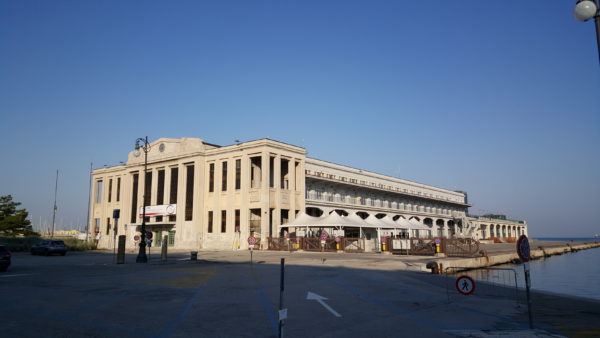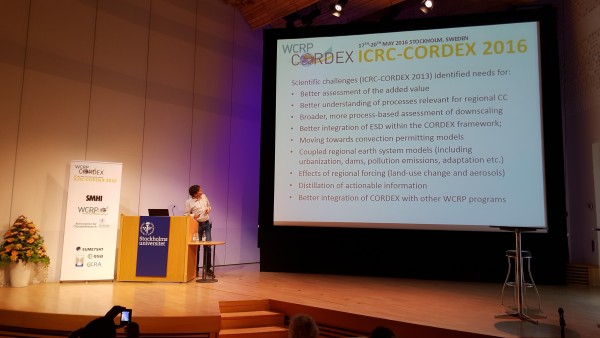Can a rising sea level can act as a boost for glaciers calving into the sea and trigger a surge of ice into the oceans? I finally got round to watch the documentary Chasing Ice over the Christmas and New Year’s break, and it made a big impression. I also was left with this question after watching it.
Climatology and meteorology are your friends
The Norwegian Meteorological institute has celebrated its 150th anniversary this year. It was founded to provide weather data and tentative warnings to farmers, sailors, and fishermen. The inception of Norwegian climatology in the mid-1800s started with studies of geographical climatic variations to adapt important infrastructure to the ambient climate. The purpose of the meteorology and climatology was to protect lives and properties.
[Read more…] about Climatology and meteorology are your friends
What has science done for us?
Where would we be without science? Today, we live longer than ever before according to the Royal Geographical Society, thanks to pharmaceutical, medical, and health science. Vaccines saves many lives. Physics and electronics have given us satellites, telecommunications, and the Internet. You would not read this blog without them. Chemistry and biology have provided use with all sorts of products, food, and enabled the agricultural (“green”) revolution enhancing our crop yields. The science of evolution and natural selection explains the character of ecosystems, and modern meteorology saves lives and help us safeguard our properties.
What is new in European climate research?

What did I learn from the 2016 annual European Meteorological Society (EMS) conference that last week was hosted in Trieste (Italy)?
[Read more…] about What is new in European climate research?
An update on mid-latitude cyclones and climate change
Why is it so hard to say what the future North European climate will look like? A recent review paper by Shaw et al, 2016 explains the reason in persuasive terms.
[Read more…] about An update on mid-latitude cyclones and climate change
References
- T.A. Shaw, M. Baldwin, E.A. Barnes, R. Caballero, C.I. Garfinkel, Y. Hwang, C. Li, P.A. O'Gorman, G. Rivière, I.R. Simpson, and A. Voigt, "Storm track processes and the opposing influences of climate change", Nature Geoscience, vol. 9, pp. 656-664, 2016. http://dx.doi.org/10.1038/NGEO2783
Scientists getting organized to help readers sort fact from fiction in climate change media coverage
Guest post by Emmanuel Vincent
While 2016 is on track to easily surpass 2015 as the warmest year on record, some headlines, in otherwise prestigious news outlets, are still claiming that “2015 Was Not Even Close To Hottest Year On Record” (Forbes, Jan 2016) or that the “Planet is not overheating…” (The Times of London, Feb 2016). Media misrepresentation confuses the public and prevents our policy makers from developing a well-informed perspective, and making evidence-based decisions.
Professor Lord Krebs recently argued in an opinion piece in The Conversation that “accurate reporting of science matters” and that it is part of scientists’ professional duty to “challenge poor media reporting on climate change”. He concluded that “if enough [scientists] do so regularly, [science reporting] will improve – to the benefit of scientists, the public and indeed journalism itself.”
This is precisely what a new project called Climate Feedback is doing: giving hundreds of scientists around the world the opportunity to not only challenge unscientific reporting of climate change, but also to highlight and support accurate science journalism.
Do regional climate models add value compared to global models?
Global climate models (GCM) are designed to simulate earth’s climate over the entire planet, but they have a limitation when it comes to describing local details due to heavy computational demands. There is a nice TED talk by Gavin that explains how climate models work.
We need to apply downscaling to compute the local details. Downscaling may be done through empirical-statistical downscaling (ESD) or regional climate models (RCMs) with a much finer grid. Both take the crude (low-resolution) solution provided by the GCMs and include finer topographical details (boundary conditions) to calculate more detailed information. However, does more details translate to a better representation of the world?
The question of “added value” was an important topic at the International Conference on Regional Climate conference hosted by CORDEX of the World Climate Research Programme (WCRP). The take-home message was mixed on whether RCMs provide a better description of local climatic conditions than the coarser GCMs.
[Read more…] about Do regional climate models add value compared to global models?
What is the best description of the greenhouse effect?
What exactly is the greenhouse effect? And what does it look like if we view it from a new angle? Of course, we know the answer, and Raymond Pierrehumbert has written an excellent paper about it (Infrared radiation and planetary temperature). Computer code used in climate models contain all the details.
[Read more…] about What is the best description of the greenhouse effect?
Anti-scientists
Ross McKitrick was so upset about a paper ‘Learning from mistakes in climate research’(Benestad et al., 2015) that he has written a letter of complaint and asked for immediate retraction of the pages discussing his work.
This is an unusual step in science, as most disagreements and debate involve a comment or a response to the original article. The exchange of views, then, provides perspectives from different angles and may enhance the understanding of the problem. This is part of a learning process.
Responding to McKitrick’s letter, however, is a new opportunity to explain some basic statistics, and it’s excellent to have some real and clear-cut examples for this purpose.
[Read more…] about Anti-scientists
References
- R.E. Benestad, D. Nuccitelli, S. Lewandowsky, K. Hayhoe, H.O. Hygen, R. van Dorland, and J. Cook, "Learning from mistakes in climate research", Theoretical and Applied Climatology, vol. 126, pp. 699-703, 2015. http://dx.doi.org/10.1007/s00704-015-1597-5
Climate change is coming to a place near you
What are the local consequences of a continued global warming? And what kind of future climate can you expect for you children? Do we expect more extreme events, and will a global warming affect the statistics of storms? Another question is how the local changes matters for local communities and the ecosystem.
It may be contrary to most people’s impression. We have a clearer picture of future climate changes on a global scale than of the local consequences associated with a global warming. And we know why.
[Read more…] about Climate change is coming to a place near you
